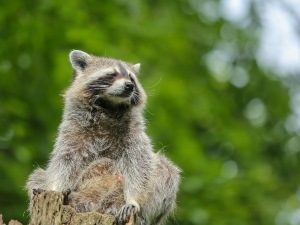
Japanese beetles may not be harmful to humans, but they are definitely harmful to plants, this insect attacks a wide variety of plants. In the wild, pest control is done by animals that eat Japanese beetles, these animals keep the Japanese beetle population in check.
A variety of animals eat these beetles, so how about raccoons? Do raccoons eat Japanese beetles? This article looks into it
Raccoons can and do eat Japanese beetles. Raccoons eat a variety of insects, insects make up a large part of the raccoon diet, Japanese beetles included. This food is relatively easy to catch for raccoons and the insects are made up of about 40% protein
Table of Contents
Do raccoons eat Japanese beetles?
Raccoons will eat almost anything they can get their hands on and almost anything put in front of them. They are opportunistic feeders.
These animals are also omnivores, they eat a variety of plant and animal matter, insects included, and Japanese beetles included.
How Japenese beetles fit into raccoons diets:
Raccoons eat these pervasive bugs both in the wild and in suburban areas when they come across them. Insects make up a large part of the raccoon diet in the wild. They are both easy to catch for raccoons and are a good source of a variety of vitamins and minerals
Not only are Japanese beetles tasty and nutritious to humans, but they are also tasty and nutritious to raccoons as well. These bugs have a high protein content, around 40% of their body weight is protein.
Humans may prepare this bug in a variety of ways, like frying them and having them raw in salads, but raccoons can eat these bugs just as they are, no cooking needed.
It is true that these beetles carry bacteria, but the raccoon’s body has its own way of fighting bacteria off. Any bacteria on the bugs will be killed in the raccoon’s stomach. Raccoon stomach acids are stronger than human stomach acids
These beetles can be found in well-maintained grasses. Raccoons living in urban areas find them while looking for food in your yard.
Once raccoons find these beetles they will pick them using their human hand-like paws, manipulating their paws to catch these insects is common for raccoons
What kills Japanese beetles?
Birds:
Birds act as pest control in the wild. These animals eat a variety of insects including Japanese beetles.
Birds that eat these beetles include crows, purple martins, gulls, Grackles, starlings, meadowlarks, cardinals, chickens, catbirds, and swallows
Ducks:
If you have ducks in your garden, don’t be surprised to see these animals eating Japanese beetles.
Ducks are a pesticide-free method of pest control, especially in rural areas. Ducks are especially helpful because they eat both adult beetles and larvae
Tachinid fly:
These flies are a type of Japanese beetle parasite. The process of killing the beetle starts off with the fly attaching its eggs to the beetle’s body.
After hatching, the maggots enter the beetle’s body to feed. The larvae eat the beetle from the inside out killing the beetle
Other animals that eat the Japanese beetle include skunks, wild turkeys, moles, blue jays, spiders, sparrows, shrews, assassin bugs, robins, ants, and ground beetles
How do you keep Japanese beetles away?
Neem oil:
Neem oil can be used as pest control on these insects because it contains potassium bicarbonate. To use this oil for pest control, apply the oil onto the plant or spray the plant using this oil.
The adult beetles will eat the oil and the chemical will be passed on to their eggs. The chemical will cause the larvae to die before they grow into full-grown beetles
Soapy water bath:
These insects create pheromones that attract other beetles, one effective way to get rid of them is to pick each beetle and drop it into a bucket of soapy water, this will cancel the pheromones out.
Row covers:
Row covers can be used on your plants to keep the beetles out.
Warning: This will also keep other insects out, namely pollinators. Remember to remove the row covers when and if your crops need to be pollinated.
The best time to use row covers is during the 6-8 week feeding period that starts from mid to late may
Conclusion
In conclusion, yes raccoons do eat Japanese beetles.
Insects make up a large part of the raccoon diet, Japanese beetles included. These insects are made up of 40% protein, this is great for raccoons.
If you enjoyed this article then you may also be interested in other raccoon related articles. Here are some articles that you may be interested in: Do raccoons eat lemons?, Do raccoons eat lizards?, Do raccoons eat kittens?,

